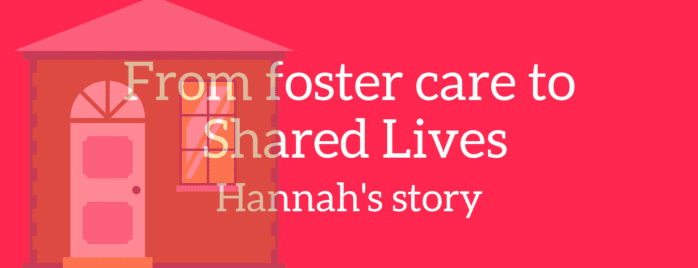May 21, 2020
Hannah’s foster care to Shared Lives story
Hannah* is supported by Shared Lives. She lives with a carer in their family home and is supported to do all the things in life she enjoys most. Hannah has a learning disability and mental health challenges. She lived with a foster carer as a child and when she became an adult didn’t feel ready to leave children’s services. She was happy with the support she got in foster care and anxious about living on her own. Shared Lives is a bit like foster care but the big difference is that is’s for adults who want and need their own freedom and independence. Their carer supports them to lead life their way and can give them emotional support and practical support around the house. This could be with cooking, cleaning, going to college, finding work or getting out and about. It’s a great social care option for people who want the best of both worlds – complete freedom and as much or as little support as they want or need.
Hannah* is 28. As a child she lived in foster care and at 17 years old she was diagnosed with a learning disability. Hannah really struggled to cope with this news and felt that this would limit her in life. The same year, Hannah’s mum sadly passed away just a few days before her 18th birthday. At this point, Hannah’s mental health struggles really spiralled. She lost control of her emotions. Hannah felt so completely lost and unable to support herself. So, Hannah’s foster carers became her Shared Lives carers so that she could carry on getting the support she needed whilst being an adult with her own independence. This is called Shared Lives: Move on.
Hannah has stayed with Shared Lives ever since, living with different carers today in their family home. Having been scared that she would lose her freedom because of her diagnosis, today she oozes such confidence and self-sufficience. She does the things in life she enjoys most, socialising with friends (now remotely), getting out and about on her own and doing practical stuff around the house independently. That’s not to say she doesn’t have her ‘down days’. Hannah still struggles with anxiety and depression. She has days when she simply can’t get out of bed and frequently battles suicidal thoughts. Hannah explains how her carer is her support through this. She offers patience and kindness and really understands Hannah’s condition and Hannah. Having that person to talk to can really make things so much better. ‘I have a safety net now’, says Hannah who hopes to progress to supported living in her own flat in the next few years, when she is ready.
In the theme of #KindnessMatters, we asked Hannah how she thinks people could be more kind to people like her, those experiencing anxiety and depression. ‘Stop calling us lazy’, was Hannah’s very honest and passionate reply. She gets very frustrated with the labels that people put on those experiencing low mood and depression and the perceptions people have. Some days just getting up, tidying her room or having a shower can seem like such hard work to Hannah, because life itself doesn’t seem worth living. ‘My carer supports me with that too, she sees the signs’. By noticing when someone may not be okay and acknowledging it, we could really make a difference to their wellbeing. Hannah’s advice is simple: ‘Be more understanding, text your friends and know that sometimes people can’t shake off these feelings’. Hannah also talks about people saying that you are a drain on them when venting your emotions, that you are ‘a depressive’. ‘That’s not fair…I go through stages of feeling depressed…but I am generally a very happy person’. Hannah’s advice is just to be there for everyone and consider how what you say might affect them. It’s not someone’s fault that they feel this way.
Hannah had to finish by telling us about the biggest thing that lifts her spirits. It’s to stroke one of her dogs and have them nuzzle into her. Maybe if people were as non-judgemental and loving as dogs the world would be a happier, kinder place.
#KindnessMatters
#MentalHealthAwarenessWeek

